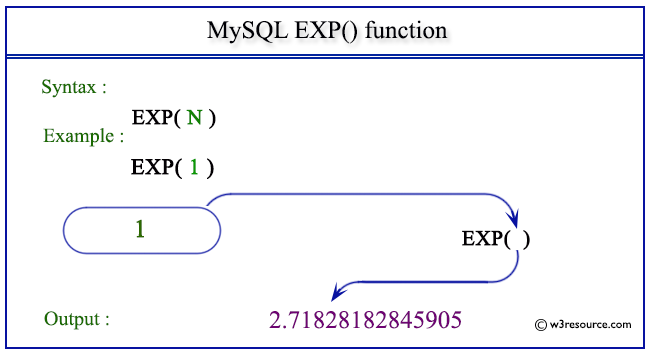MySQL EXP() function
EXP() function
MySQL EXP() returns the value of the base of natural logarithm number e, raised to the power of a number specified as argument.
This function is useful in -
- The EXP() function allows for easy calculations involving 'e'.
- The EXP() function is a vital tool in calculus for solving differential equations, particularly those involving exponential growth and decay.
- The EXP() function is used in ecology and demography to model populations, especially in scenarios where births and deaths occur continuously.
- In finance and investment analysis, the EXP() function is used to make projections about the future value of investments, taking into account compounding.
- In probability theory and statistics, the EXP() function is used to model continuous random variables with an exponential distribution.
- The constant 'e' is a fundamental mathematical constant that arises in many areas of mathematics and science.
Syntax:
EXP(N);
Argument:
| Name | Description |
|---|---|
| N | A number. |
Syntax Diagram:

MySQL Version: 8.0
Pictorial presentation of MySQL EXP() function

Example of MySQL EXP() function
Code:
SELECT EXP(1);
Explanation:
The above MySQL statement will return the value of the natural logarithm base number e raised to the power of the given number.
Output:
mysql> SELECT EXP(1); +------------------+ | EXP(1) | +------------------+ | 2.71828182845905 | +------------------+ 1 row in set (0.03 sec)
Example: EXP() function with negative value
Code:
SELECT EXP(-1);
Explanation:
The above MySQL statement will return the value of the natural logarithm base number e raised to the power of the given number.
Output:
mysql> SELECT EXP(-1); +-------------------+ | EXP(-1) | +-------------------+ | 0.367879441171442 | +-------------------+ 1 row in set (0.00 sec)
